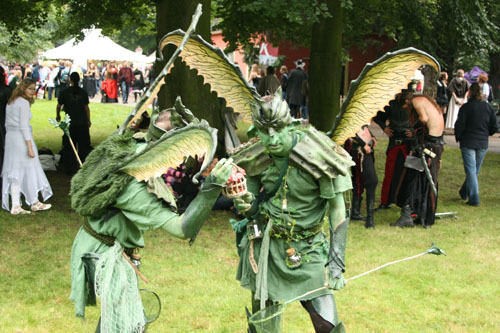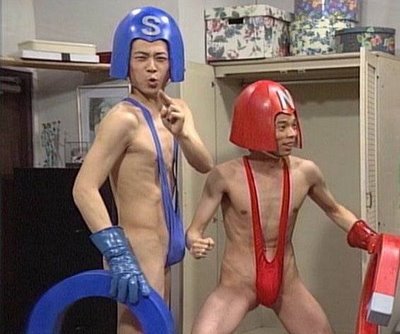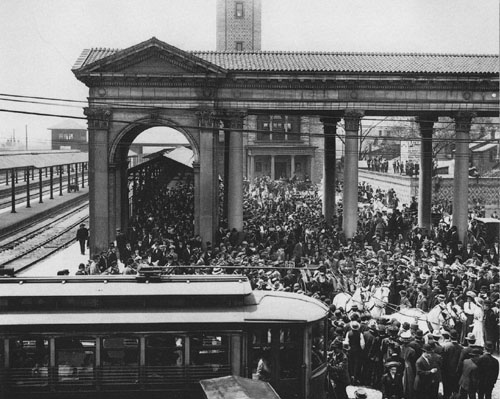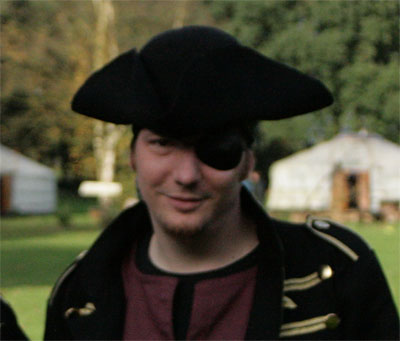Really boring books (you have to read anyway): Ayn Rands We, the living.
Written by David Dylan
One drunken night we were sitting around in our best clothes. Me in a Kimono, with my faux leather Samurai armour next to me on the floor, others in cloaks and chain-mail. We were passing around a bottle of mead cleverly disguised as a cow's leg. Me and another guy were lounging against the warm shoulders of a pretty girl, while a lesbian was mocking one of my friends while he told one of his plot-less anecdotes. A fairly normal evening in my world.

This classes only as slightly odd.
For some reason one of us got hold of one of those ladies' romance novels. It was a singularly good example of the genre. It described, for example, how the beautiful and well-endowed yet tragic heroine lowered herself in a bathtub until her nipples were barely above water. Then it went on to describe how the dark-haired, handsome and yet rough hero started kissing her in her neck, and lower, and lower, until he reached her bellybutton. By that time, drunk as we were, we all wondered how long that guy could hold his breath.
We dubbed it 'polno' because I had said it first, and being semi-racist is OK if you do it in a fantasy setting so I spoke with that typical speech impediment ascribed to Asians.

Because, you know, it's wrong to laugh at Asians.
'We, The Living' would be 'polno' had the author been a bit better at describing sex scenes, and had crammed a bit fewer chapters between them. As it stands, this book is about as arousing as Softenon.

Nope, doesn't work for me. Maybe if they wear something kinky? Nah, forget it..
The story (for lack of a word that means 'long winded sleeping pill with a plot somewhere in there') takes place between 1922 and 1925, in Russia, and it was written by Ayn Rand.
This means two things: One, it could easily have taken place between August 1st and September 2nd 1922, had it been written by anyone else. Two, it takes place during the most turbulent years after the Russian revolution.
Vladimir Iljitsj Oeljanov (Pronounced: Lenin) was busy having strokes and sending people to Gulags, while Iosif Vissarionovitsj Dzjoegasjvili (Pronounced: Stalin) was waiting in the wings for his chance to do some Gulag-sending and laughing at foreign diplomats trying to pronounce his name.

Say it, say my name bitch!
Ayn Rand (Pronounced: Alisa Zinov'yevna Rosenbaum.) was obviously affected by all this. When she moved to the United States in 1926, she'd seen it all. And in this first book she was determined to write it all down.
She started by describing a train station. In minute detail. Including the station's clock. In minute detail. (Get it? Minute! A pun!)

It's a train station. Get over it. We have them in the west.
Then she went on to describe the goings on in a "bourgeois" family during these glorious years of the peasant rule. Suffices to say, this is not a happy book. In fact, it is such an unhappy book, if it were a person it would be Emo, and try to slit its wrists with the dull spoon the orderlies let it have in its padded room. It'll have you in tears. Tears of boredom at the long-winded descriptions of the things the protagonist Kira Argounova (pronounced: silly teenage girl with big dreams) sees, hears, picks up or steps over in the streets. The bleakness of the world Rand describes is matched only by her unparalleled talent for dragging out scenes across tens of pages while a few paragraphs would have sufficed.
The thing is, though, things were really that bleak back then.
In 1917 the German provocateur Lenin had succeeded in bringing down the provisional Russian government, which was preparing general elections, by storming into their offices and plucking them from under the table where they were cowering. En passant he had the Czar and his family shot, providing the Rolling Stones with a few more lines in their one and only good song.
By doing so he established Bolshevik rule. This didn't sit well with Czarists, democrats, other communists, anarchists and, well, people in general. So after that he had to fight many major and minor wars to rid the country of these malcontent ingrates who preferred liberty, the pursuit of happiness, food on a semi-daily basis and/or a different interpretation of Marx' works over the rule of this upstart hipster with his dandy goatee.
He also had promises to break. Quite a few of them. One of them being that he'd promised all landless farmers a piece of land of their own.
There are two things Russia had in abandon at the time; poor, starving, landless farmers and land. Trouble was that much of the land was permanently frozen, and most of the farmers were, in fact, not at all happy with the idea of having land to till, yet still not owning it. They should have read the fine print, of course. Because it turned out that one of Marx' pet-peeves was people owning stuff. So giving away land, frozen or otherwise, would turn his beloved huddled masses into despised enemy-of-the-people landowners.
So, Lenin was kinda facing enemies on all sides. Presumably he was so bad at making friends he even beat himself up every morning.
What this resulted in, helped a bit by years of war prior, was that no-one was working the land. No-one felt like working in the factories, and besides, they were all off fighting the counter-revolutionaries.
So, people were hungry. Things were bad. Then this Lenin dude came along, and things got worse.
Things would stay worse for a long time. But Ayn Rand got out, reached New York, saw the skyscrapers and was so impressed that she decided to write about architects from then on.

New York, another thing we have in the west.
This resulted in a fairly readable book, Fountainhead, which is to this day a bestseller amongst right-wing loonies like myself and, for some reason, architects.

Not an architect.
It also resulted in this monstrosity. Although the idea of an attractive female engineering student does appeal to me (she knows this), the protagonist fails to pique even the tiniest bit of my interest. The other characters in the book are one-dimensional and seem to cry or shout a lot. If they do neither, they preach either the virtues of capitalism, or communism. Both in the dullest, most uninspiring ways imaginable.
Yet, you still have to read this. The history of the Soviet Union istaught in schools and colleges in passing -- at best -- and if the follyof the socialist economic system is mentioned at all, it's usually onlyas a side-note. In most cases, you will have to take your professor'sword that it doesn't work -- assuming this unfortunate aspect ismentioned at all. Teachers and professors once were, after all, studentsas well. Fortunately, empirical evidence has shown us that there aregenerally two types of students: the ones who do not wind up as professors, and liberals.
What this book shows the reader, through the eyes of people who were living it and written by someone who was there, is why it does not work. It ruthlessly reveals the socialist state for what it is: an uncompromising monster that eats its young, spits out the carcases and leaves people too chewed up, too beaten down, too disenfranchised to produce or innovate.
It's also a great conversation starter on the train/bus/subway to work. That is, if you class being spat at by middle-class white kids as 'conversation'.
If all else fails though, you could use it to throw at liberal professors. It's nice and heavy. It should do some well-deserved damage.
Metadata:
- ID: 4852
- Type: 2
- Title: Really boring books (you have to read anyway): Ayn Rands We, the living.
- Subtitle:
- Author: David Dylan
- Author ID: 109
- Date Posted: 2010-08-10T21:00:27